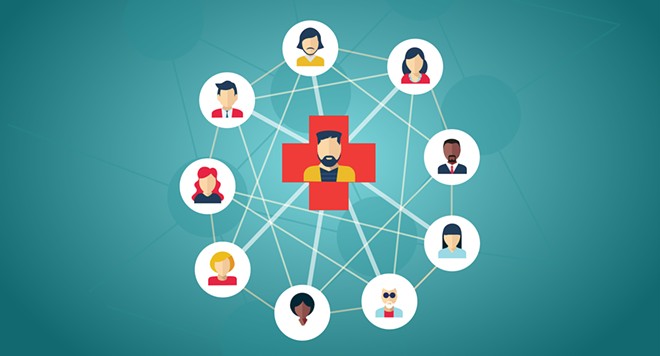Virtual support: COVID-19 changes access to traditional face-to-face and group methods of addiction counseling
By Kasey Bubnash[
{
"name": "Promo Temp Targeted",
"id": "PromoTempTargeted",
"class": "inlineCenter",
"insertPoint": "4",
"component": "15511697",
"requiredCountToDisplay": "0"
},
{
"name": "Ad - Medium Rectangle CC01 - 300x250 - Inline Content",
"class": "inlineCenter",
"insertPoint": "8",
"component": "15582119",
"requiredCountToDisplay": "12"
},{
"name": "Ad - Medium Rectangle LC01 - 300x250 - Inline Content",
"class": "inlineCenter",
"insertPoint": "18",
"component": "15582122",
"requiredCountToDisplay": "22"
},{
"name": "Ad - Medium Rectangle 9 - 300x250 - Inline Content",
"class": "inlineCenter",
"insertPoint": "28",
"component": "15582121",
"requiredCountToDisplay": "32"
}]
Support groups and group therapy play an important role in treating a number of mental and behavioral health issues, but nowhere are those strategies more prevalent than in addiction and substance-abuse treatment programs.
From SLO County's court-ordered and voluntary addiction programs, to private in-patient rehab centers, to Alcoholics Anonymous and Narcotics Anonymous, the sharing of lived experiences among nonjudgmental peers—the people who've been there and done that—is a reoccurring theme.
"People like to know they're not alone," said Frank Warren, coordinator of the Mental Health Services Act for the SLO County Behavioral Health Department. "And most people who have hit bottom or have had some sort of extremely negative impact because of their substance use can be ostracized by their family or their social group or their work group, and they feel isolated. Group therapy allows people to feel connected."
But with a statewide shelter-at-home order in place and social distancing measures being encouraged, connecting face to face has become a challenge for everyone. For now, the COVID-19 pandemic is changing the way addiction treatment is conducted on the Central Coast.
Group meetings and therapy sessions, court-mandated addiction programs, and DUI programs are by and large being held via Zoom, and SLO County Behavioral Health is leaning on telehealth and telepsychiatry for one-on-one counseling and appointments. Nearly 80 percent of the county's behavioral health services are now being provided virtually, Warren said, and the transition, for the most part, was smooth.
But Warren still worries about accessibility at a time when it's more important than ever to have support.
People worldwide have lost wages, work hours, or their jobs entirely, and longstanding routines have been broken. Americans are being encouraged to self-isolate and stay home as much as possible, distancing even from family and close friends. It's a time marked by uncertainties and loneliness, which Warren said could bring on some of the emotions—boredom, fear, anxiety, and depression—that often trigger people to use and abuse drugs and alcohol.
Warren is concerned that SLO County residents struggling with or recovering from substance abuse might assume local treatment programs and groups are on hold for the pandemic. There are some benefits to the pandemic though. With bars and restaurants closed and gatherings prohibited, Warren said there's less social pressure to drink.
"But it's our concern, and we're hearing from our staff that they are hearing, that people are struggling," Warren told New Times. "We really want people to reach out."
But not many are, and Warren said some of the county's clients are stepping away from their ongoing addiction treatment.
Whether that's because locals are simply stepping away from everything they normally do right now, or because they don't know how or don't have the means to access the online meetings, Warren said he isn't completely sure. But he wants everyone to know that the SLO County Behavioral Health Department is still fully operational and is offering support services to residents struggling to pivot to the virtual treatment model.
Those without computers or internet access, however, can still attend in-person appointments and group meetings through the county. The group sessions, while smaller, less frequent, and brimming with COVID-19 safety measures, are essentially being conducted as they've always been.
"We're helping people convert to telehealth, but obviously not everyone has the capacity," Warren said. "We'll meet clients where we need to meet them."
That isn't the case for the region's Alcoholics Anonymous and Narcotics Anonymous chapters, although they're doing the best they can to host regular group meetings and stay connected online and over the phone.
Under normal circumstances, the District 22 Central Coast Alcoholics Anonymous chapter hosts more than 300 group meetings each week throughout the region. Now the organization is conducting about 90 meetings every week via Zoom, according to Jeff L., Central Coast AA's chair of communications. Jeff and others in the AA and NA programs requested that New Times not use their full names to maintain anonymity.
The online model has its downsides. The social aspect of AA has been, to some degree, eliminated. Jeff said a lot of people will go out for coffee or food after the meetings, and that's often how members make friends through the program. Jeff is also worried about accessibility for those who struggle with technology.
"If they don't have the technology that's another problem and that's just something we can't help because of the circumstances," he said. "Most people, it seems, are doing really well with the Zoom meetings."
But there are also some upsides. The Zoom meetings, which Jeff said have been masterfully scheduled by webmaster Bob R., really do feel like real, in-person meetings. They're also easier to make it to for those with busy schedules or who are nervous about joining the program.
"So it might be a good way for newcomers to warm up to the program," Jeff said, "because they can do it from the safety of their own home."
Central Coast Narcotics Anonymous is facing the same coronavirus-related challenges. Meetings have shifted to Zoom, and the organization's facilities are closed to the public, according to coordinator Mike R. There is concern over those potential members who might fall through the cracks during the COVID-19 shutdowns, but, for now, Mike said virtual meetings are the only option.
"By isolating, people have kind of isolated too much," Mike told New Times. "So we're just doing the best we can, and we're hoping we can keep people connected." Δ
Staff Writer Kasey Bubnash can be reached at [email protected].
Latest in News
Readers also liked…
-

SLO police identify alleged driver who hit and killed couple
Dec 22, 2022 -

When the levee breaks: Oceano residents, county officials walk a tightrope of regulations to manage Arroyo Grande Creek, which some say led to the levee's failure in January
May 18, 2023 -

Cal Poly report highlights offshore wind's potential to spur green energy transition
Jun 8, 2023










